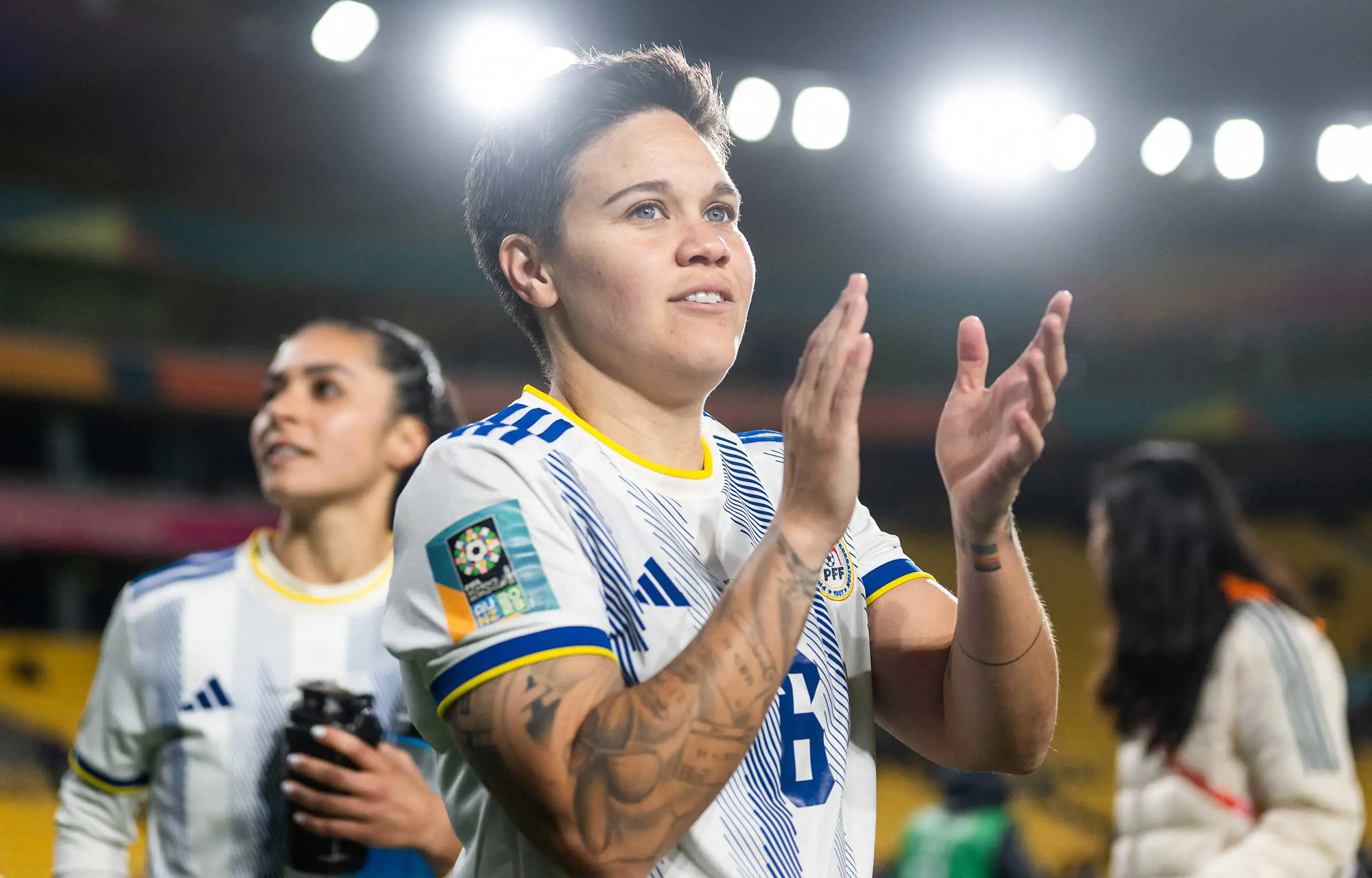Player Op-Ed
Tahnai Annis: "We need to talk about post-tournament blues"
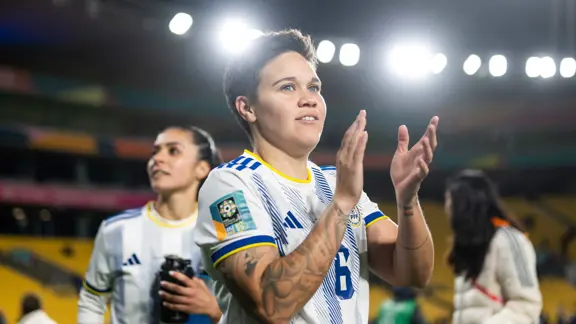
About the author
Philippines midfielder Tahnai Annis writes openly about her experiences with post-tournament blues and how the football industry can do more to protect players’ mental health after international competitions.
By Tahnai Annis
The Philippines playing at our first World Cup in 2023 felt even more remarkable considering we have only had a national team since the 1980s.
Boxing, basketball and volleyball have traditionally been the country’s most popular sports, but in the last five years or so, football has risen through the ranks – and the success of the women’s national team has played a big part in that.
Football’s following in the Philippines may be confined to specific pockets of the country, but the passion it generates is immense. At Australia & New Zealand 2023, the world was able to witness that unwavering Filipino support.
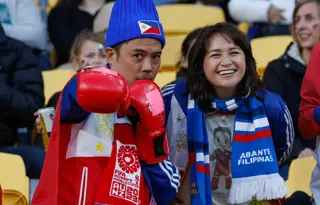
Any airport, any hotel we arrived at, we had legions of Filipinos waiting to greet us with flowers and open arms. Whether it was in the stadiums in Dunedin, Wellington or Auckland, it felt like every single Filipino that lived in New Zealand was at our matches. In our final game against Norway, a match in which they kept possession for a bulk of the time, the crowd’s roar any time we came in contact with the ball was deafening. We desperately wanted to do them proud.
After the extreme high we experienced after beating co-hosts New Zealand and gaining our first win at a World Cup, we suffered a tough loss against Norway in our final group stage match. Yet, it was hard to feel sadness in the moments after the final whistle seeing Filipino fans had stayed, crying tears of happiness because they were proud of us. As we made our final walk around the pitch, they were still cheering for us.
As the dust began to settle on the World Cup, I started to experience post-tournament blues – the emotional drop that can happen to players after a big competition when we haven’t had the opportunity to fully process our experiences. It wasn’t the first time I had encountered those feelings.
I first felt it after the 2022 Asian Cup, and again after winning the AFF Championship, yet other national team players and I couldn’t put a name on it at the time. Whatever sensations we were experiencing, the closest feeling we could articulate was a sort of ‘paralysis’. I knew I needed to train. I knew I needed to run. I knew I should leave the apartment. But, for whatever reason, I just couldn’t. I'm having intense paralysis today. The first few times that it happened I was consumed by it.
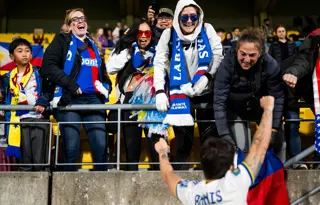
After working so long towards the goal of tournament football as a team, experiencing the highs of the competition together, having that routine, and then it suddenly all coming to an end with no football from anywhere between four and six weeks, I felt lost. Alone. Isolated. It was as if the discipline and motivation that had driven me during the tournament had somehow dissipated afterwards.
It felt like I was living life parallel to everyone around me when I would return from international duty. It was difficult to reintegrate and relate to my surroundings.
Intense feelings of guilt then started to creep in. Our third-place tying finish at the Asian Cup meant the Philippines had qualified for our first ever World Cup. So why was I feeling so unmotivated and low having just been part of something so historic? I couldn’t make sense of it.
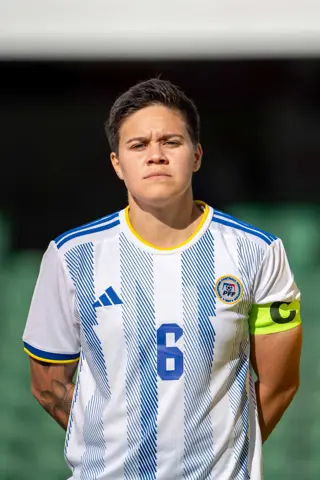
When FIFPRO released the Post-Tournament Blues Guide in 2022, the language helped me to better understand what I was feeling. Even just putting a name to what I was experiencing helped a lot. I therefore felt more prepared for what was to potentially come after the World Cup, even if it was a different intensity of post-tournament blues.
I had weeks of no football after the tournaments in 2022, which brought its own challenges, but after the World Cup in 2023 I was immediately thrown back into club football in Iceland with little recovery time. I was back playing in a match 72 hours after returning from New Zealand.
Our preparation leading up to the World Cup was probably the most extensive of any national team there in terms of how many camps we held and the number of international matches we played from the Asian Cup in early 2022 to July 2023. Returning to club football straight away left little time and space to decompress after being away for many weeks with no days off at the biggest tournament in women’s football.
Even if you’re a player that isn’t getting as many minutes on the pitch at a tournament, you’re still on the clock during that time with training, recovery, meetings, appearances. There were no days off for us during that time.
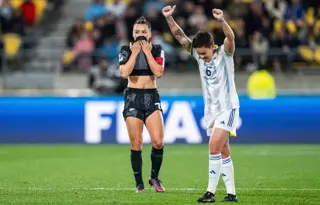
Domestic leagues and federations could institute breaks during international competitions like the World Cup or Olympics and have a grace period afterwards, so that there is less pressure on players having to immediately return to club football and they are afforded a sufficient rest and regeneration period. I missed five games of the Icelandic season while I was in New Zealand and while I knew my body and mind needed rest, I felt like I couldn’t ask for time off to have that recovery since I had missed so many club matches already.
I returned from the World Cup in early August and I didn’t feel in a good spot mentally and emotionally again until mid-September. My body didn’t get a rest until November with my club season concluding in October and then being back on international duty within several days.
There also needs to be more accessible mental health professionals for women’s players post-tournament. During the World Cup we had access to counsellors, but that much-needed resource wasn’t there after the tournament. Not everyone is going to use it – and that’s completely fine – but that resource should be there at a time when players need it.
The Post-Tournament Blues Guide is a resource I would like to see circulated more at clubs and national teams to generate that awareness and facilitate open conversations
With another high-stakes competition in the form of the Olympic Football Tournament now over, we need to ask: how can we support other players who may be experiencing post-tournament blues? Sharing with others helps a lot, whether that’s having a conversation about how you’re feeling with team-mates or someone outside of football.
The Post-Tournament Blues Guide helped me a lot personally. It’s a resource that I would like to see circulated more at clubs and national teams to generate that awareness and facilitate open conversations about it.
The first time I experienced it after the Asian Cup, I didn't even know how to talk about it. But I’ve since learned we just need the time and space to process the things that happen at such big tournaments, and know that it’s natural to feel drained emotionally, mentally, and physically. When you have awareness and sufficient language around it, it becomes easier to manage and move through.
As a professional footballer, you don’t need to feel silly or embarrassed that you’re experiencing sadness or feeling low. It doesn’t make you any less of an elite athlete. It doesn’t mean you’re not equipped to compete at the highest levels. Yes, it’s a vulnerable and scary thing to admit you’re feeling that way, but it takes a hell of a lot of strength to be open about it and share with others.
So, if you’ve just come back from the Olympics, whether it was a positive or negative experience, take time to decompress. Take time to process what has happened. Take time to think about post-tournament blues and how you can best move through these emotions. Even if it’s just for a few minutes a day.
